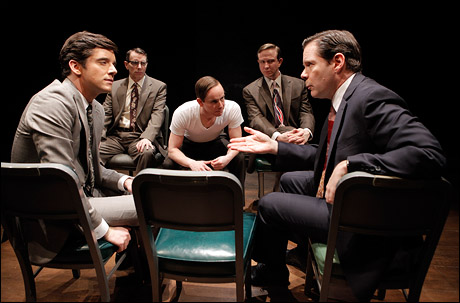My luck ran out. In today’s Wall Street Journal drama column I review three new plays, Next Fall, The Temperamentals, and Equivocation, only one of which I liked, and that one with reservations (though I do think it’s worth seeing). Here’s an excerpt.
* * *
In art, good intentions count for something–but not much. The intentions of Geoffrey Nauffts’ “Next Fall,” a new play about a man (Patrick Breen) whose much younger lover (Patrick Heusinger) is dying, are palpably high-minded, and I suspect that many playgoers will think that this makes it worth seeing. Alas, “Next Fall” is cliché-infested and cloyingly sentimental, and the fact that it has transferred to Broadway after a successful Off-Broadway run means only that you can fool some of the people most of the time.
To say what happens in “Next Fall” is to suggest its relentless predictability. Luke (Mr. Heusinger), a simple-minded but pretty young actor-waiter, falls for Adam (Mr. Breen), a bright but frustrated writer-candle salesman of a certain age. They move in together and would undoubtedly be destined for untroubled happiness were it not that Luke is a born-again Christian whose belief in God prevents him from coming to terms with his homosexuality and admitting it to Arlene (Connie Ray) and Butch (Cotter Smith), his extremely southern parents. Solution: He prays after having sex…
Don’t be fooled by the religious trappings of “Next Fall.” We’re in the world of movie-of-the-week dramaturgy, a never-never-land of tinsel epiphanies and black-and-white creatures like Butch, who is not a human being but a symbol of intolerance…
 If you want to see a worthwhile new gay play, I recommend Jon Marans’ “The Temperamentals,” which suffers from some of the same faults as “Next Fall” but has the distinct advantage of being intelligent and, up to a point, unpredictable. The good part is the first act, in which we meet a group of deeply closeted gay men living in Los Angeles in the ’50s, a time when homosexuals who dared to be themselves in public invited social ostracism–or worse. The five main characters of “The Temperamentals” are the founders of the Mattachine Society, one of America’s first pro-gay organizations, and in the first act Mr. Marans introduces us to these cautious, ever-watchful men, portraying them so shrewdly and sympathetically that you want to know much, much more about the way they lived then.
If you want to see a worthwhile new gay play, I recommend Jon Marans’ “The Temperamentals,” which suffers from some of the same faults as “Next Fall” but has the distinct advantage of being intelligent and, up to a point, unpredictable. The good part is the first act, in which we meet a group of deeply closeted gay men living in Los Angeles in the ’50s, a time when homosexuals who dared to be themselves in public invited social ostracism–or worse. The five main characters of “The Temperamentals” are the founders of the Mattachine Society, one of America’s first pro-gay organizations, and in the first act Mr. Marans introduces us to these cautious, ever-watchful men, portraying them so shrewdly and sympathetically that you want to know much, much more about the way they lived then.
I know that critics are supposed to review the show they saw, not the one they’d rather have seen, but I wish that Mr. Marans had dumped the second act of “The Temperamentals” and turned the first act into a full-length black comedy of manners about life in the Eisenhower-era closet. No sooner does “The Temperamentals” become an episode of “Great Gays in History” than it grows painfully preachy…
For sheer pretentiousness, it’d be hard to beat Bill Cain’s “Equivocation,” which has arrived in New York after making the regional rounds. This historical fantasia, in which we are invited to imagine what might have happened had King James I (David Furr) ordered William Shakespeare (John Pankow) to write a play about the Gunpowder Plot of 1605, is by turns self-consciously clever and elephantine in its contemporary political parallels…
* * *
Read the whole thing here.
Terry Teachout on the arts in New York City
